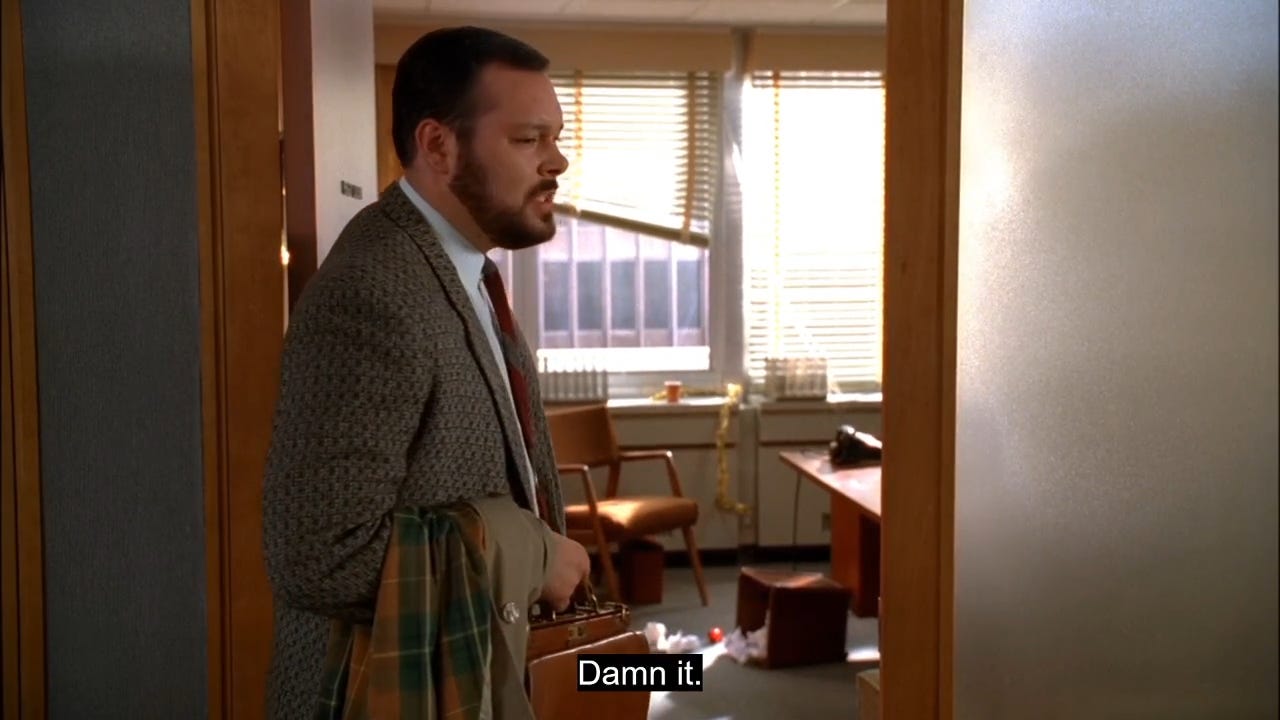Season 3: Episode 13
“Shut the Door, Have a Seat”
Written by Matthew Weiner & Erin Levy
Directed by Matthew Weiner
Setting: December, 1963
Season 3 has been building towards destruction.
The death of President Kennedy.
The end of Don and Betty’s marriage.
The selling of Sterling Cooper.
The show is at its most frustrating but necessary during moments of inaction. While Don sleeps in his office or Roger is too drunk to notice his business slipping away, the clock ticks.
“Shut the Door, Have at Seat” isn’t set at midnight. This episode captures the feeling of the last minute before a deadline. It’s 11:59 and anything is still possible, you just have to get moving.
Mad Men offers valuable lessons on failure. You cannot pretend the future isn’t coming and any attempt to recapture the past will only make the transition into that future more painful.
The lesson in this season finale is not on how to avoid failure but what to do in its aftermath. These characters have failed and the ones who survive see opportunity in that failure.

Season 2, often intentionally dull, was a limbo period that showed these successful people weren’t actually accomplishing anything. Life was a comfortable-uncomfortable lie. I see Season 3 as a fulfillment of what Mad Men always wanted to be and it’s why Season 4 has one of the greatest episode runs in TV history. This is a journey and in this season finale, Don Draper rises from the ashes and fulfills his destiny that has been building since 1960.

After Betty tells Don that she is divorcing him, he finally wakes up and sees through his own illusion. Don has spiraled over far less in the past because he was blinded by his comfortable life and its lies. He has control over everything but, in the end, no real meaning because his feet were never on the ground.
Don was always ready to run.


With Sterling Cooper being sold for parts when 1964 begins, Don realizes that there is something within his power.
His work.
He may not be able to save his marriage or even reputation, but his work can still be his own. The end of something is not the end of everything.
It is interesting that we have seen all of these characters fail under lesser struggles but, when faced with the end of all they know, Don and his team step up. They don’t have to lie anymore or wears masks to pretend they are happy. Joan steps into the new agency as if this was always her destiny to return. It feels natural and right.
Roger puts aside his petty bickering with Don (that will be a distant memory come next season), Cooper secures a greater legacy when he could have easily just retired, Don shows Peggy the respect that Hilton never truly showed him, and Lane Pryce steps up to bat and proves himself not just a necessary partner but a damn good one.
Lane, a favorite among fans, actually has a dry first season. The vast majority of his scenes are spent looking stuffy and annoyed while even stuffier and more annoyed British people command him what to do. He’s stuck in limbo too, a thankless soldier in a fight that means nothing to him besides that he must do it. Don Draper’s rebellion against what is expected by those with a fatter paycheck inspires him. Lane realizes just how much power he has and he uses that power to sever Don, Bert, and Roger from their contracts so they can start their own agency.
A lot of this season could be seen coming but Don Draper being fired on purpose! That was a surprise.
It’s a sad episode where the Mad Men we knew says goodbye. Don moves out of his house, never again will we see the office walls of the old Sterling Cooper, and half of the employees that we have come to know and… well, not love per say… are cast into oblivion.
But it also makes you want to hit the ground running and achieve something lasting. As satisfying as it is to see Don Draper rise to his destiny and start a new agency, you end this episode immediately hungry to experience what is next. I actually jumped ahead to Season 4’s first episode the moment I finished this rewatch just so I could have that satisfaction.
The moral this episode presents you is that no matter what causes the failures in your life, all of your life is not a failure. To quote It’s a Wonderful Life, “No man is a failure who has friends.”
With everything crushing down on you, there is still opportunity. The hardships in life only defeat you if you sit down and take it. With every reason to give up and return to a meaningless existence where days bleed together and tomorrow presents nothing, moving forward is a necessity.
Even if you are given no reason to believe in a better tomorrow, you have to. Your belief can inspire others and their belief will inspire you.
You’ll work together to realize that future.
Don Draper has realized the ultimate failure of one of his most iconic quotes said in the show’s pilot episode.
“I’m living like there’s no tomorrow… because there, isn’t one.”
There is a tomorrow and, while it won’t be easy and the unknown can make it horrifying to view from a comfortable present, you’ll get there and figure it out.
Failures in the past do not have to define you, but your actions in the present will.
What do you want in your future?
The past is about understanding and the future is about opportunity.
Balance both to live in a meaningful present for yourself and others. One that you can build together.
See everyone next season!













Great analysis as always and thank you for the lol at Don’s love for sleeping